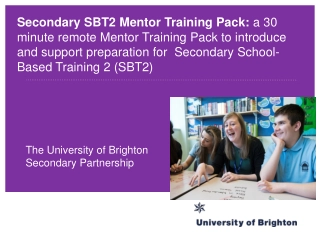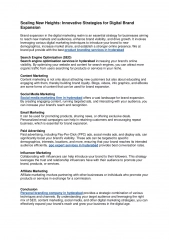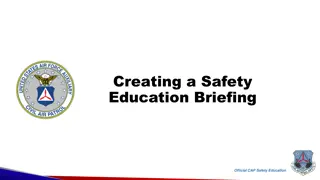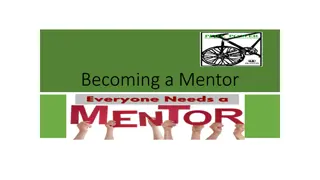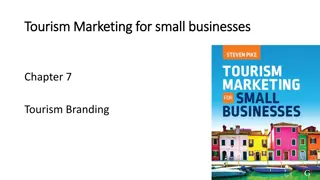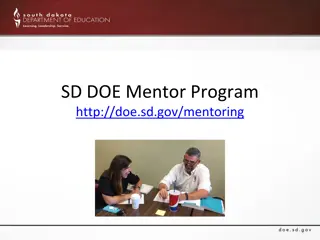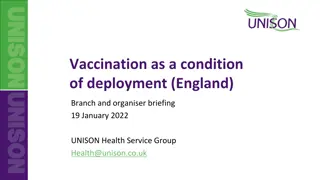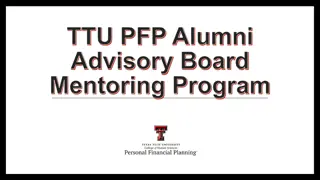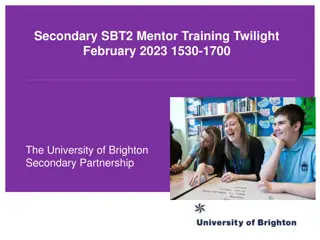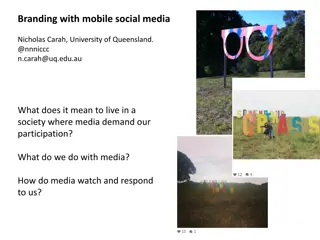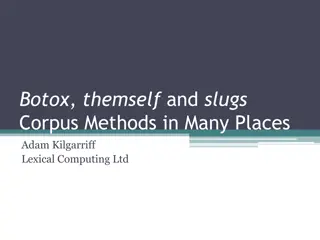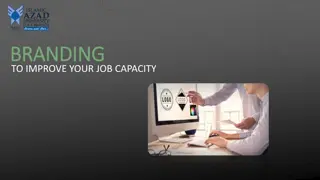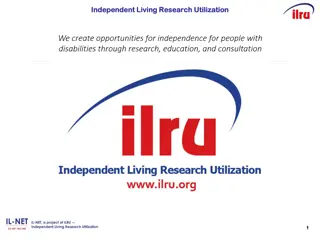
Empowering Organizational Diversity Through Mentoring and Training Services
Discover the Housing Diversity Network (HDN) offering mentoring programs, training, and consultancy services to boost diversity, governance, and leadership within organizations. Benefit from membership perks like online resources, networking events, and strategic guidance for inclusive practices. Join a community of professionals committed to driving positive change and showcasing best practices in diversity and inclusion.
Download Presentation

Please find below an Image/Link to download the presentation.
The content on the website is provided AS IS for your information and personal use only. It may not be sold, licensed, or shared on other websites without obtaining consent from the author. If you encounter any issues during the download, it is possible that the publisher has removed the file from their server.
You are allowed to download the files provided on this website for personal or commercial use, subject to the condition that they are used lawfully. All files are the property of their respective owners.
The content on the website is provided AS IS for your information and personal use only. It may not be sold, licensed, or shared on other websites without obtaining consent from the author.
E N D
Presentation Transcript
HDN Mentoring 2018 - 2019 Briefing
This briefing will provide: Introduction to HDN HDN Mentoring objectives & framework Mentoring roles & expectations Matching process Time commitment & practicalities Benefits of mentoring Development tools used as part of the programme PPI/DISC Psychometric tool What support is available
Notting Hill Housing Introduction to Housing Diversity Network (HDN) https://www.wulvern.org.uk/Images/wulvern_logo.gif Thirteen Group L Q - Creating places where people want to live Our expertise in diversity develops your organisation s effectiveness. Supporting you to: attract and grow the best talent deliver appropriate, accessible services build inclusive communities Orbit Group For Customers AmicusHorizon logo A2Dominion Group - Shared ownership affordable housing http://www.asra.org.uk/media/1496105/asra.png http://www.togetherhousing.co.uk/img/logo.png http://www.thrivehomes.org.uk/wp-content/themes/thrive/images/logo.png http://www.swan.org.uk/images/swan-housing-logo-new.png We have over 80 Members across England mainly Housing Associations, some ALMO s and local authorities. https://www.networkhomes.org.uk/media/1003/logo.png Great Places Housing Group - return to home page Over 200 organisations access our training and consultancy services logo
Introduction to Housing Diversity Network (HDN) We enable organisations to: Increase board & staff diversity Strengthen governance Understand their customers Deliver social value and corporate social responsibility Design accessible services Develop inclusive leadership Develop change programmes Stay compliant Showcase their good practice Learn from a wide network of professionals and specialists Mentoring Programmes Training & Consultancy Conferences & Events
Benefits of Membership Places on our CIPD Award Winning Staff Mentoring Programme Access to on-line Resources Monthly e-briefing Free advice and help line Strategic regional networking events Reductions on our Board Mentoring Programme, Training and Consultancy & DNA (Diversity Network Accreditation)
Benefits of Membership Online Self Assessment Tool (Launched for members from July 2017) Work with NHF Young Leaders Programme to increase diversity in leadership Developing services to increase diversity on Boards High level national Conference and Celebration event 15 Years Young Launching our new Branding and Strategy
What people say about our services Board Mentoring The programme is visionary and mentoring should become part of the basic support for all board members David Orr, Chief Executive National Housing Federation Extremely positive experience. It helped me to achieve what I wanted through the restructure at work and has given me the confidence to look more positively at work and life. Staff Mentoring participant likely to deliver impressive behavioural change the deal for organisations is brilliant CIPD Awards Judges about our Staff Mentoring
HDN Mentoring outcomes & framework Overall Learning Outcomes to be achieved: Increase your self-awareness Improve your confidence Expand your networks Explore career aspirations and options Increase awareness of wider sector issues Enhance understanding of Unconscious Bias, Diversity and Inclusion Overall Framework includes: A ten month programme that starts in September, finishing in July A briefing of content/structure/roles/ tools/ skills at the start for all Five one-to-one sessions with an external mentor/mentee Four professional development classes. These sessions combine discussion & reflection based learning along with expert speakers from housing and other related sectors. Mentees are required to attend them. Mentors can choose to attend any. A national celebration conference at the end of the programme for all mentees, mentors & supporters An evaluation and overall feedback opportunity at the end of the programme On-going support during the programme Overall Skills Development: Interpersonal skills Team work skills Listening and communication skills Feedback & initiative skills Presentation skills Influencing skills Personal reflection skills
HDN Mentoring outcomes & framework Example time table you can refer too. Local class sessions are confirmed at the start Sept Oct Mentee and mentor s training Nov Mentoring class 1 Dec Second 1-2-1 Session with mentee Jan Mentoring class 2 Feb Third 1-2-1 Session with mentee Matching First 1-2-1 Session with mentee Mar Mentoring Class 3 Apr Fourth 1-2-1 Session with mentee May Mentoring class 4 June Final 1-2-1 Session with mentee July Mentoring conference HDN issue final evaluation survey
Mentoring roles & expectations Exercise what makes a good mentee/mentor?
Mentoring roles & expectations A mentor is a: Supporter Role Model Guide Shares sector knowledge and business information Guides towards solution Provides a good example Explores different perspectives Demonstrates best practice Encourages use of resources and contacts Helps to develop connections Listens to and empathises with concerns Encourages stepping out of the comfort zone Shares views on how to succeed Critical friend tells the uncomfortable truths Gives support when mistakes are made Helps identify the mentee s personal style and behaviours to maintain or improve Recognises and celebrates achievements Provides regular, constructive feedback
Mentoring roles & expectations What makes a great mentor? Some Key Skills Demonstrating commitment to the mentee by prioritising, preparing & focusing in meetings Asks questions Brings out creativity Allows silence Manages time well Gives ideas Shows empathy Challenges perceptions Creates space Non judgemental Helps me think differently Makes me challenge myself Gives me time to reflect Uses different techniques Interested Adapts style/approach Gives me time to reflect Open powerful questions Active listening Use of silence Feedback- holding up the mirror Building on strengths Building rapport Challenge and support Solution focussed Self awareness and reflection
Mentoring roles & expectations Phases of the mentoring relationship Stage 1: Starting out Create an alliance Prepare for the relationship Establish trust and rapport values Power of self-disclosure Agree a contract & boundaries & ground rules Use the Personal Development Log Stage 2: Getting established Allow mentee to tell their story Discuss strengths and weaknesses, experiences, knowledge and skills, and the organisational context within which they work and any other aspects which may affect self development Start to focus on learning and growth Record any progress Stage 3: Developing independence Facilitate deeper learning by encouraging the mentee to reflect, to see things differently, identify potential changes Mentor becomes devil s advocate - confronting, stimulating and challenging the mentee to look at options and choose the best for them. Helping to devise a detailed plan of action and encourage innovation and creativity Stage 4: Ending Acknowledge progress and achievements Encourage mentee to continue their development lifelong learning Good practice suggests that a mentoring relationship is set up for a finite period Agree with your mentee what (if anything) happens next contact by email, catch up for coffee later in the year?
Mentoring roles & expectations A few more ideas Be clear about the length of the mentoring relationship and how it will end Assist your Mentee in setting future goals. Identify any support or resources that could assist in achieving these goals. Acknowledge any progress that you have observed with your Mentee. Encourage your Mentee to continue on this development path (life long learning) Agreeing a contract and setting appropriate boundaries Procedural - what process will we follow in our sessions? Psychological - how will we best work together? Privacy - how will we manage confidentiality? Permission- what do you want me to do/not do? Potency - how are we going to make this as effective as possible? Professionalism - sticking to agreed dates, times, actions
A useful structure to conduct high quality conversations Goal what would you like to achieve? Reality-where are you now? Options what could you do? Will what will you commit to?
Mentoring roles & expectations Using effective questioning to set goals Why can be a very powerful part of the question, however it often causes people to be defensive and encourages justification over exploration, it is better to use, what or how i.e. Why are you demotivated at work vs what are the factors that lead to you feeling demotivated Incisive questions If you weren t to hold back, what would you do? What if you were to try that? What might happen? If you trusted your wisdom/ experience/ expertise/ heart/ intelligence/ best friend what would you do? What do you mean by ? Could you give me an example? What might you be assuming here that s blocking your thinking? If you were to . what might happen? In what way are you being held back?
Mentoring roles & expectations Creating the Thinking Environment 1. Attention listening actively with respect, interest and fascination Incisive Questions removing assumptions that limit ideas Equality treating each other as thinking peers Appreciation practising a 5:1 ratio of appreciation to criticism Ease offering freedom from rush or urgency 6. Encouragement moving beyond competition Feelings allowing sufficient emotional release Information providing a full and accurate picture of reality Place creating a suitable physical environment that shows you value the person Diversity embracing differences 2. 7. 3. 8. 4. 9. 5. 10. Adapted from Time to Think , Nancy Kline Building your Capability S T O P Step back Think Consider your options Plan: what will you do?
Matching Process At HDN we match mentees with mentors personally by reading every single application or CV and not using any software. There are a number of mentors who repeat mentor each year and we get to know so are able to match more effectively. The criteria we tend to use is: Ensure mentees are matched with mentors from a different organisation Ensure the objectives of a mentee are matched as closely as possible with the skills and experience of the mentor Ensure any mentee special requests e.g. a female only mentor, are met Ensure that mentors and mentees are geographically as close as we can make it Ensure mentees line manager statement is used for extra information Ensure we check length of time at an organisation or in a role or any access requirements, if any of that impacts matching Ensure organisations check the matching to identify any conflicts of interest Take into account any other information if possible, for example background information from steering groups where they operate Once the matching is complete HDN send you and your mentee an email with each others applications/CV s, Personal Development Log and a Mentoring Agreement attached for you to use to prepare for and during your first meeting together.
Time commitment and practicalities Time commitment: Mentors provide 5 meetings for 1-2 hours each to their allocated mentee over the duration of the programme Mentors have a briefing with HDN in person/by phone/electronically re: the content & structure, to discuss any questions Mentors if you have time to attend one or two of the group sessions to support mentees, meet other mentors and facilitate any specific areas you feel comfortable with, we do encourage this One-to-one meeting practicalities (Also see PDL): Introduce yourselves, get to know each other Discuss confidentiality (are there any circumstances when confidentiality would need to be breached?) Agree dates with your mentee for all 5 if not as many meetings in as advance as possible, then prioritise them Ideally position sessions between classes with the first session held before Class 1, if possible Choose a location that suits you both Ensure environment is conducive to private conversation Length of session may be variable, 1-2 hours is usual but you may use more or less depending on both your preferences or availability Discuss boundaries, roles, what you want from each other through the process, expectations and objectives for the programme at the start. Be realistic and honest with each other Discuss how you will reflect, follow up actions, review and provide feedback and any expectations around this. As this is not an academic course but the one-to-one sessions may result in actions agreed Ensure the mentee leads, sets the agenda and makes the most of the sessions. Mentors might encourage, listen, support, guide, question, feedback, help assess options, help action plan but they are not there to make decisions or take the lead for the mentee We encourage you to meet in places such as cafes/meeting rooms/in your offices and during working hours if possible If you have any questions or concerns speak to your local Mentoring Coordinator or HDN directly.
Organisational and individual benefits of mentoring For Mentors Opportunity to share skills and expertise Opportunity to develop coaching, feedback listening and self-reflection skills Insight into other organisations Learn from their mentee and other mentors or speakers Give something back to the sector Feel positive about the development of others For Mentees Feel valued and supported by their organisation Improve their skills and benefit from experience Learn and embed knowledge more quickly Improve their confidence and motivation Networking opportunities Assess their career options & aspirations Understand more about themselves and others around them to work more effectively to bring out the best in each other For the organisation Happier, more confident, more successful staff Supporting continuous learning Sector insight and best practice Contributing meaningfully to the Equality and Diversity agenda Supporting talent to grow in the sector Being part of a CIPD award- winning programme
Development tools used as part of the programme CV development to record achievements & skills & develop a punchy personal statement STARS framework to record achievements PPI DISC based psychometric tool, providing reports and charts for discussion, self- awareness and development Locus of Control how do I manage myself (see next page) Circle of Influence what can I control or influence? PDL Personal Development Log provided to all mentees and mentors for recording meeting notes, actions, achievements and reflections. There are tools, handouts and resources available on HDN s website in the mentor section, which you can access by registering on: https://www.housingdiversitynetwork.co.uk/join-us/registration
How do I manage myself? LOCUS OF CONTROL External Locus of control Internal Locus of control Take responsibility for their actions Do things that will change their situation for the better Emphasis is on striving for personal and professional achievement Work hard to develop their knowledge, skills and abilities When things go wrong they are inquisitive and try to work out why things turned out the way they did Tend not to blame others Have a more participative management style Tend not to rely on other peoples evaluation for their self- esteem Strong boundaries and weak barriers in most areas Have the ability to inner reflect Take little or no responsibility for their behaviour Blame others for what is wrong in their life Tend not to do things that will change their life for the better Emphasis is to avoid coming out of their personal comfort zones When things go wrong they often do not learn from their mistakes Tend to rely on other people s approval to make them feel good Have weak boundaries and strong barriers Lack the ability to be able to inner reflect
PPI/DISC Psychometric tool Developing self awareness Why do organisations use psychometric profiling and assessment tools? (HDN provide mentees and mentors the opportunity to complete a psychometric tool near the start of the programme) Recruitment Talent management Personal development/leadership development Career development Team development Coaching Mentoring
PPI/DISC Psychometric tool Introducing PPI Dr. William Moulton Marston PPI is a work based personality profiling tool, developed from the original work of Dr. William Moulton Marston Psychometric testing is based on Trait Theory (Eysenck and Cattell). People can use their preferred and non preferred styles Both mentees and mentors can complete PPI Insight for personal reflection and development during the programme Situational and contextual factors Personality profiling tools do not measure or predict skills and abilities People can use their preferred and non preferred styles Report will be confidential and only shared with your mentor HDN provide information at the first two group sessions in every region about PPI. So, if you are interested in learning more about it and taking part speak to your local mentoring coordinator, and try to attend the group sessions for the part of the day that it will be covered. If you are unable to attend there is lots of information on the internet about DISC and you can also ask HDN for more
Personality Performance Indicator (PPI) The questionnaire: Is online, you can be sent a link for it There are 24 questions and it takes about 5-7 minutes to complete There are 4 words on each line and you have to choose the one that is most like you and the one that is least like you. This can be difficult to do and you may need a dictionary handy Answer quickly and spontaneously There are no right and wrong answers Be true to yourself The report: Is approx. 10 pages long and there is also a profile chart available which will need an explanation from your local mentoring coordinator or HDN Understanding and using the results Class 2 will provide more information, explanation and support Opportunity to share and ask questions Do share your report with our mentee or mentor
What support is available HDN 01484 652 606 HDN Mentoring Manager 0774 562 7460 Your local Mentoring Coordinator (See PDL for details) Your own internal mentoring contact (please ask HDN if you re not sure who it is) Your own HR/L&D departments Your fellow mentors
You will also find the following documents on our website or contact us and we can email them for further information: PDL Mentoring programme guidance document Mentoring agreement Mentoring resources from the group sessions Mentoring resources for mentors Thank you. Any Questions? Housing Diversity Network (HDN)


